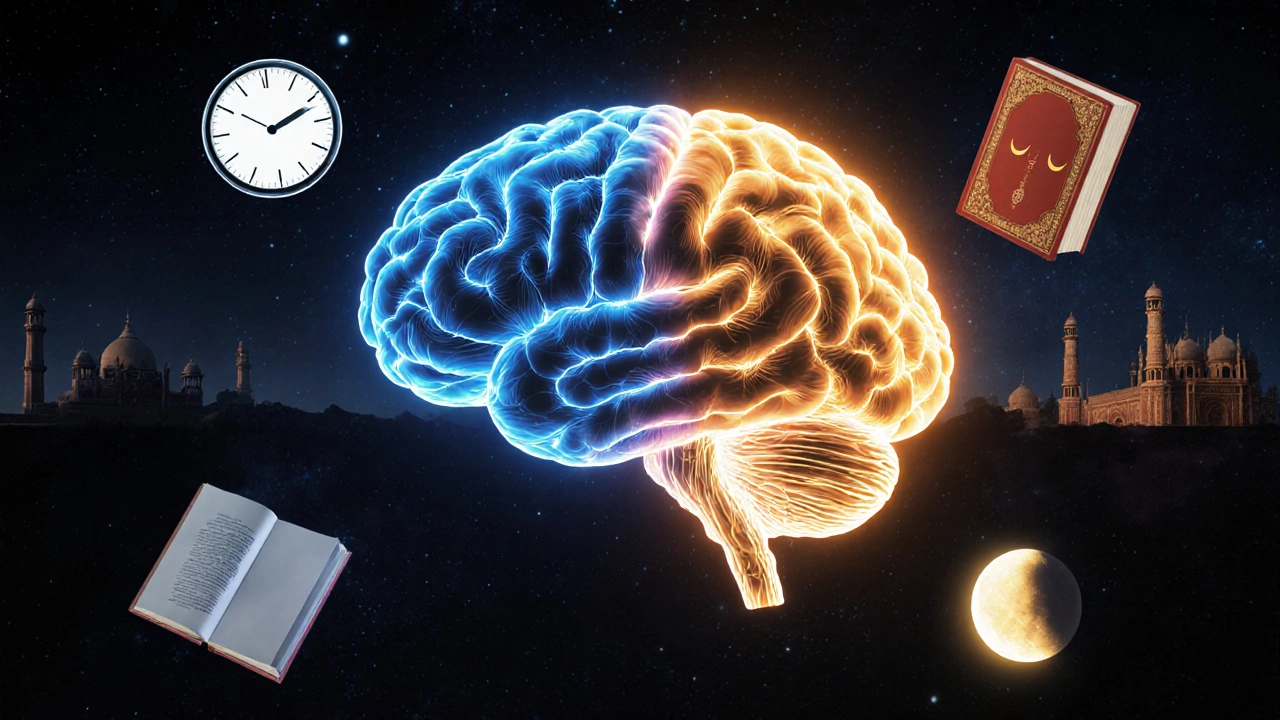Study Timing Optimizer
Find Your Peak Study Time
Discover when your brain works best for learning and retention. This tool uses scientific insights about circadian rhythms to help you schedule your study sessions for maximum effectiveness.
Your optimal study window for maximum retention and focus
Studying for competitive exams isn’t just about how long you sit with your books-it’s about when you sit with them. Many students burn out after months of late-night cramming, only to realize their focus fades by 8 p.m. Others wake up at 4 a.m. feeling exhausted, wondering why their retention is so poor. The truth? The best time to read for competitive exams isn’t the same for everyone, but it’s not random either. Science, experience, and thousands of successful candidates point to a clear pattern: timing matters more than you think.
Your brain has natural high and low points
Your body runs on a circadian rhythm-a 24-hour internal clock that controls when you feel alert, sleepy, or mentally sharp. Research from the University of Oxford shows that most people experience two peaks in cognitive performance: one between 9 a.m. and 11 a.m., and another between 4 p.m. and 6 p.m. These are your brain’s natural windows for deep focus, memory encoding, and problem-solving.
For competitive exams like UPSC, SSC, GATE, or NEET, you need to absorb complex material, solve tricky questions, and retain facts under pressure. That’s not something your brain does well at 2 a.m. or right after lunch. If you’re trying to memorize constitutional articles at midnight, you’re fighting biology. But if you study between 8 a.m. and 11 a.m., your working memory is at its peak. That’s when you’ll remember 30% more vocabulary, formulas, or legal provisions than you would in the evening.
Why early morning works for most toppers
Look at the study routines of top scorers in India’s civil services or engineering entrance exams. Most wake up between 5 a.m. and 6 a.m. Not because they’re superhuman, but because the morning offers something no other time can: zero distractions. No phone notifications. No family interruptions. No social media doomscrolling. Just quiet, fresh air, and a mind that hasn’t been overloaded with daily noise.
Studies from the Indian Institute of Management (IIM) show that students who studied between 5:30 a.m. and 8 a.m. retained 40% more information over a 30-day period compared to those who studied after 9 p.m. Why? Because sleep quality improves when you don’t study late. And better sleep means better consolidation of what you learned.
Try this: the first thing you do after waking up is drink a glass of water, do 5 minutes of stretching, and open your book. Don’t check your phone. Don’t make tea first. Start reading immediately. Your brain is still in a state of high plasticity-easily absorbing new data. This is when you should tackle your hardest subjects: reasoning, math, or law.
The afternoon slot: review and practice
After lunch, your energy dips. That’s not a sign you’re lazy-it’s biology. Between 1 p.m. and 3 p.m., your core body temperature drops, and melatonin levels rise slightly. This is the perfect time for lighter tasks: revising notes, solving MCQs, or watching short concept videos.
Don’t try to learn new topics now. Instead, use this window to reinforce what you studied in the morning. Flashcards work great here. So do timed quizzes. This is also when many students benefit from group study-if you’re disciplined. Talking through a concept out loud helps your brain lock it in. But avoid long, unfocused chats. Stick to the plan.

Evening: wind down, don’t overload
From 6 p.m. to 8 p.m., your brain has a second peak. This is ideal for light revision, summarizing the day’s work, or practicing writing answers for mains exams. You can review your morning notes, rewrite key points in your own words, or do one full-length mock test under timed conditions.
But here’s the trap: many students think evening is for cramming. They open new chapters at 9 p.m., stay up till 1 a.m., and wonder why they forget everything by Wednesday. Your brain needs time to process what you’ve learned. If you go to bed right after intense studying, your brain doesn’t get the chance to consolidate. That’s why you wake up and feel like you learned nothing.
Instead, finish your last study session by 8:30 p.m. Then take a walk, listen to calm music, or meditate. Avoid screens. Blue light suppresses melatonin and delays sleep by up to 45 minutes. If you’re preparing for a 9 a.m. exam, you need to be asleep by 10:30 p.m. at the latest.
What about night owls? Can you study late?
Yes-but only if you’re truly a night person, not just someone who scrolls until midnight. A 2024 study by the National Institute of Mental Health and Neurosciences (NIMHANS) tracked 1,200 aspirants over six months. Only 12% were true night owls-people who naturally felt alert after 11 p.m. and struggled before 9 a.m. For them, studying between 10 p.m. and 1 a.m. worked. But even they slept by 4 a.m. and napped in the afternoon.
If you’re not one of those 12%, don’t force it. Trying to become a night person just because “everyone else does” leads to burnout, poor memory, and anxiety. Your schedule should match your biology, not Instagram influencers.
How to find your personal best time
Here’s a simple 7-day test:
- Day 1-2: Study 7 a.m. to 9 a.m. Track how much you remember after 24 hours.
- Day 3-4: Study 5 p.m. to 7 p.m. Do the same.
- Day 5-6: Study 10 p.m. to 12 a.m. Again, test recall.
- Day 7: Compare. Which session gave you the clearest recall? Which left you feeling energized, not drained?
Write down what you remembered. Don’t guess. Be honest. If you forgot half the things you studied at night, that’s your answer.
Also, track your sleep quality. If you wake up tired even after 8 hours, your timing is off. Your brain doesn’t rest well if you’re studying too close to bedtime.

What to avoid at all costs
Here are three mistakes that ruin even the best schedules:
- Studying in bed-your brain associates your bed with sleep. If you study there, you’ll get drowsy.
- Switching times daily-your circadian rhythm thrives on routine. If you study at 6 a.m. one day and 11 p.m. the next, your brain never settles into a rhythm.
- Ignoring breaks-study for 50 minutes, then take 10. Your brain needs pauses to file away information. Try the Pomodoro method: 25 minutes on, 5 off. Repeat.
Also, don’t compare your schedule to someone else’s. A topper from Delhi might study at 4 a.m. because they’re used to the heat and noise of their home. You live in a quiet flat in Edinburgh-your environment is different. Your rhythm should be too.
Final tip: Align your study time with your exam time
If your exam starts at 10 a.m., train your brain to be sharp at 9 a.m. Start waking up at 6 a.m. and doing full mock tests at 9 a.m. every weekend. Your body will adapt. Your focus will improve. Your confidence will grow.
Competitive exams aren’t won by the person who studies the most hours. They’re won by the person who studies at the right time, with the right energy, and the right recovery. Pick your window. Stick to it. Let your biology work for you-not against you.
Is it better to study in the morning or at night for competitive exams?
For most people, morning is better. Between 8 a.m. and 11 a.m., your brain is most alert, and your ability to absorb and retain new information is at its peak. Night studying often leads to poor sleep and low retention. Only true night owls-about 12% of people-benefit from late hours. If you’re not one of them, stick to mornings.
How many hours should I study daily for competitive exams?
Quality matters more than quantity. Most top performers study 6 to 8 focused hours a day, broken into 2-3 blocks. Studying 12 hours with distractions and fatigue won’t help. Focus on deep work during your peak hours, take real breaks, and sleep well. That’s more effective than grinding all night.
Should I study the same subject every day at the same time?
Yes. Your brain learns patterns. If you always study math at 7 a.m. and history at 5 p.m., your mind gets ready for each subject at that time. This reduces mental resistance. Switching subjects randomly makes it harder for your brain to enter the right mode.
Can I study effectively after a full day of work or college?
It’s possible, but it’s harder. If you’re exhausted after work, your brain’s energy is already spent. Try studying right after waking up, even if it’s just for 45 minutes. That’s better than forcing 2 hours at night when you’re drained. If you must study after work, keep it light-review notes, do flashcards, or solve 10 questions. Save deep learning for your peak hours.
What if I can’t wake up early? Can I still succeed?
Absolutely. If you’re naturally a late riser, don’t force yourself into a 5 a.m. routine. Instead, find your peak window-maybe it’s 10 a.m. to 1 p.m. Use that time for your hardest topics. Protect it like a meeting with your future self. Consistency beats timing. Even if you study at noon every day, you’ll outperform someone who studies at 6 a.m. but skips days.
Next steps: Build your schedule today
Grab a notebook. Write down your current study hours. Then write down when you feel most alert during the day. Now, match your toughest subjects to your peak energy times. Block out your calendar like a work meeting. No exceptions. Stick to it for 14 days. Track your recall. Notice the difference.
This isn’t about being perfect. It’s about being smart. Your time is limited. Your brain has limits. Work with them, not against them.






